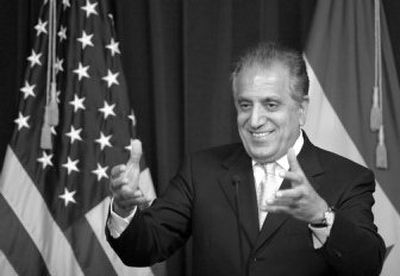U.S. envoy tells Iraqis to ‘step up’

BAGHDAD, Iraq – With a final wave, departing U.S. Ambassador Zalmay Khalilzad boarded a U.S. military helicopter and flew out of Baghdad on Monday, warning Iraqi leaders that they risked losing the support of impatient U.S. voters if they didn’t “step up” and make the tough decisions necessary to bring peace to the strife-torn nation.
Addressing a farewell news conference inside the fortified Green Zone, Khalilzad said Iraqi leaders had taken important steps toward overcoming their sectarian differences, including approving draft legislation on sharing Iraq’s oil wealth. But with pressure mounting in Washington to set a timetable for U.S. withdrawal, he said Iraqis needed to act quickly to stabilize the country.
“I know that we are an impatient people,” Khalilzad said. “I constantly signal to the Iraqi leaders that our patience, or the patience of the American people, is running out.”
It was a stark warning from an envoy who was a strong supporter of the U.S.-led invasion in 2003 and continues to say that peace, prosperity and democracy can be achieved.
Known as a tireless worker, Khalilzad was still going over documents as he sat in the Black Hawk helicopter waiting to take off Monday night.
Khalilzad will be replaced within days by Spokane Valley native Ryan Crocker, a career diplomat who last served as ambassador to Pakistan.
Khalilzad, President Bush’s nominee as U.S. ambassador to the United Nations, arrived in Iraq in June 2005, determined to reverse the slide toward civil war. He leaves behind a country awash in bloodshed.
Sectarian killing and insurgent attacks surged after the bombing of a revered Shiite shrine in Samarra in February 2006. Tens of thousands of Iraqis have been killed in fighting between Sunni Arab and Shiite militants.
The number of U.S. casualties has reached at least 3,242, according to the Web site icasualties.org.
“I have been very saddened and concerned that the level of violence has been as high,” Khalilzad said on a last swing Thursday through the largely peaceful Kurdish region in the north. “Sectarian violence in particular has been a great threat.”
Khalilzad spent much of his 21 months in Iraq trying to woo the disaffected Sunni Arab community that dominated under Saddam Hussein into the political process, hoping to undercut support for insurgents fighting U.S. forces.
Through endless meetings, and over countless cups of tea, Khalilzad hammered out a deal on a new constitution, including a provision allowing revision of sections that infuriated Sunni Arab politicians.
He also is credited with persuading the embittered minority to participate in the country’s first full-term elections in December 2005 and cajoling all sides into what was termed a unity government. Khalilzad’s negotiations extended to representatives of Sunni Arab insurgent groups he hoped could be persuaded to form a united front with the government against al-Qaida in Iraq, he told reporters Monday.
Khalilzad conceded Monday that much remained to be done. He urged Iraq’s leaders to move quickly to disband paramilitary groups, set a date for local elections and make the constitutional changes needed to make the document acceptable to all ethnic and religious groups.
In a sign of progress, al-Maliki, a Shiite, and President Jalal Talabani, a Kurd, announced that they would send a bill to parliament as early as today to allow former ranking members of Saddam’s Sunni-dominated Baath Party to rejoin the civil service and military.